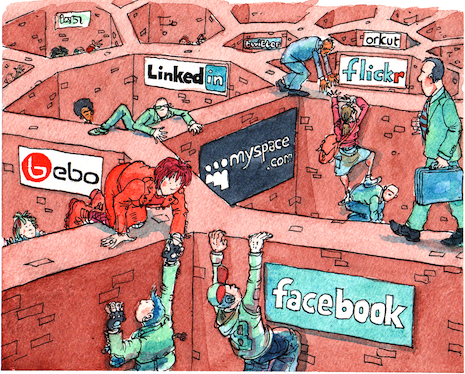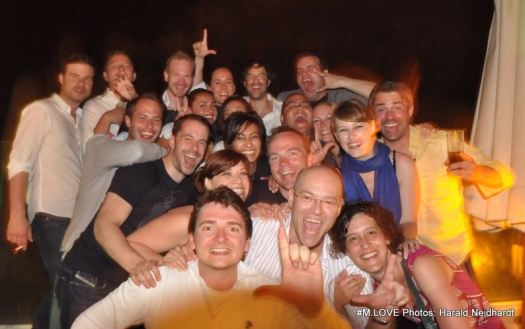This post was originally published in my entrepreneurship column on The Kernel. Check it out, it’s like a sort of candid Economist for the technology scene.
Facebook must evolve sooner rather than later. This article explains why.
If Facebook wants to maintain its position as the silo for the vast majority of our social data (at least, in the Western world) it must become the plumbing of the social web. A platform, not a destination website. .
It can’t do both. If it tries to, I predict it will go the way of AOL and Compuserve before it. They held on to the model of their walled gardens and didn’t evolve. They died as epicentres of the web as a consequence.

Walled Gardens by Cartoonist David Simonds – click to vist his bio
In their case they lost to the world wide web. In Facebook’s case, it could be to some new distributed social graph, possibly even some open source protocol thingamajig-whatsit. Facebook needs to focus more on the social plumbing and then needs to work out how on earth to monetize that plumbing, or the wisdom the ownership of that plumbing could provide.
Assuming for a moment Zuck doesn’t choose the path of the plumbing the social web, what ever kills Facebook will likely not look nor be anything like Facebook (so unless something drastic happens to Diaspora, that rules them out).
Facebook has like buttons and comment boxes around the web, but it’s not enough. They also focus on sucking content in to be displayed on Facebook.com. Facebook connect and other features are all important tentacles to the Facebook.com body, but at the need remains to drive traffic to that central site.
Social data, social media and social gamification (whichever label whish to choose) are all such natural additions to our online lives, because we are social animals, that the growth of “social” as it now rather peculiarly referred to will continue unabated until it encompasses every facet of our digital existence. Expect your Nest to be comparing your neighbour’s house temperature with your own sometime soon!
For Facebook all this of course means a grand opportunity. Many people understand that, hence the investment which was poured in early and the subsequent float this year. But I don’t believe Facebook can be sufficiently agile to provide the social plumbing and storage of all that social data, as well as keep hold of all those eye balls on what is an increasingly sprawling online destination. Already we spend what is an unnatural time on one website. Google at least, used to have the mantra to get us off their site as soon as possible; Facebook’s is the opposite.
There’s nothing wrong with wanting our eye balls of course, but the Facebook feed has become a compromise for circa a billion people and content as diverse as photos, tweets, blog posts, Zynga updates and Nike Fuel band scores.
It’s still early doors on the social web
We’re so early in the life of the social web that Facebook, while already struggling to transform from being a “web” desktop company into a true “mobile” orientated company, will need to shed its skin once again – and probably sooner rather than later – in order to become to the social web what Google was to search.
I may of course, be too early to market with this prediction (something I’ve been sadly all too prone to) so the weight of this predication depends on how fast mobile, web and social apps, along with the consumer behaviour, evolves. I believe it will accelerate yet still.
I’ve met Mark. You’ll now be surprised to hear he’s uber smart. I’d be amazed if he wasn’t very aware of all this. But will he be able to turn the juggernaut fast enough without it jack knifing? Or will by then will he, as one of the youngest richest most successful entrepreneurs ever, care?
It is simply very hard indeed to change the heritage of a company at scale. IBM succeeded only by amputating its entire physical body and becoming a lone, albeit successful, services head.
The curse of knowledge
Most companies fail to truly reinvent themselves. Microsoft missed the boat with the Internet and has been playing catch up ever since. Google missed out on social. And Facebook nearly missed out on mobile, but may have scraped through; the jury is still out and I’m unconvinced because mobile is still so early. As Molly Wood said on CNET, Facebook wasn’t born mobile.
The next cash cow will be whatever is invented for social, as adwords was allied with search. These bads will be all about understanding who we are and what we are doing: behavioural advertising.
Today’s vast social data silo (Facebook’s alone runs to the 100’s of petabytes) can provide that insight from which Facebook can profit, much like my own new start-up (sorry, blatant plug). But the danger is they are too busy driving people to Facebook.com and worrying about the design of the newsfeed, fixing their iPhone app or creating new photo albums, instead of capitalising on Facebook’s real crown jewels: the social network itself (which by the way, is a fact Twitter is currently failing to realise also as it busily cuts off its developer nose to spite it’s data-silo face in the race presumably for more control, which it hopes will equals more revenue).
If you own the social connections and the communication between people, you own the knowledge. Through data mining, you can hopefully turn this knowledge in to the wisdom of intent and other new-fangled behavioural analytics. In the age of data overload, context and understand mean cash.
There are a lot companies trying to tackle context and user behaviour, some more successfully than others. My old company Rummble, now Rummble Labs, which pivoted to B2B personalisation services using the Trust Graph technology I co-invented, is just one of many.
In conclusion ladies and jellyspoons
You don’t need a walled garden to understand how a bee pollinates a flower. In fact, if one flower is inside the garden wall and one outside, the wall simply hinders the bee in its process of pollination. So if the bumble bee is a piece of social data and the two flowers are you and me, the beehive is Facebook. And you don’t need a walled garden, to own the most efficient and busy beehive. Just a garden with as few walls as possible.














